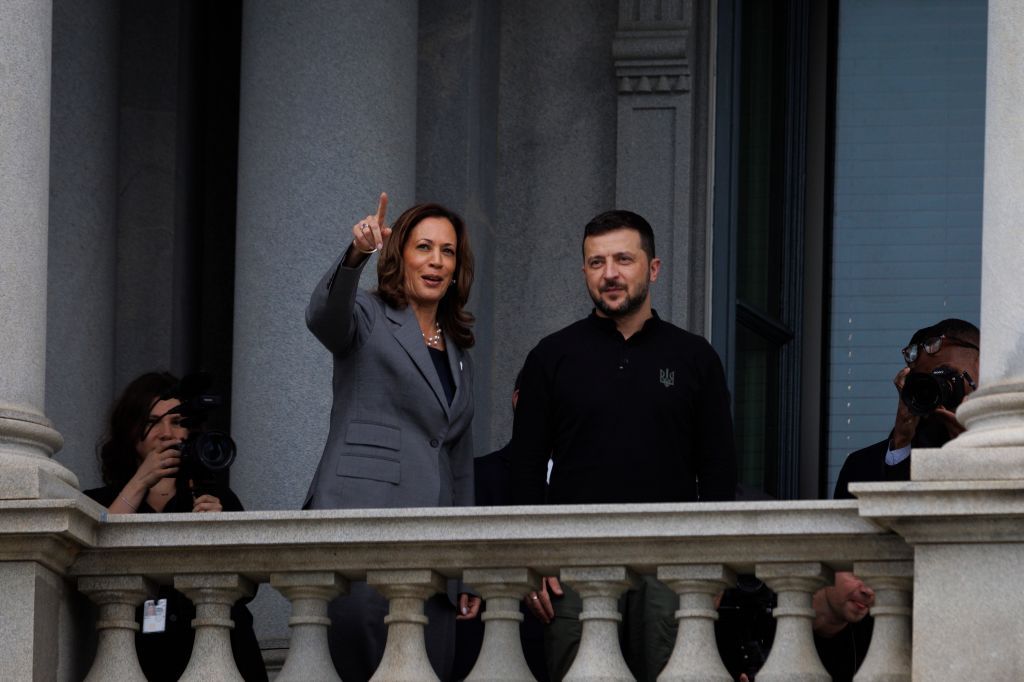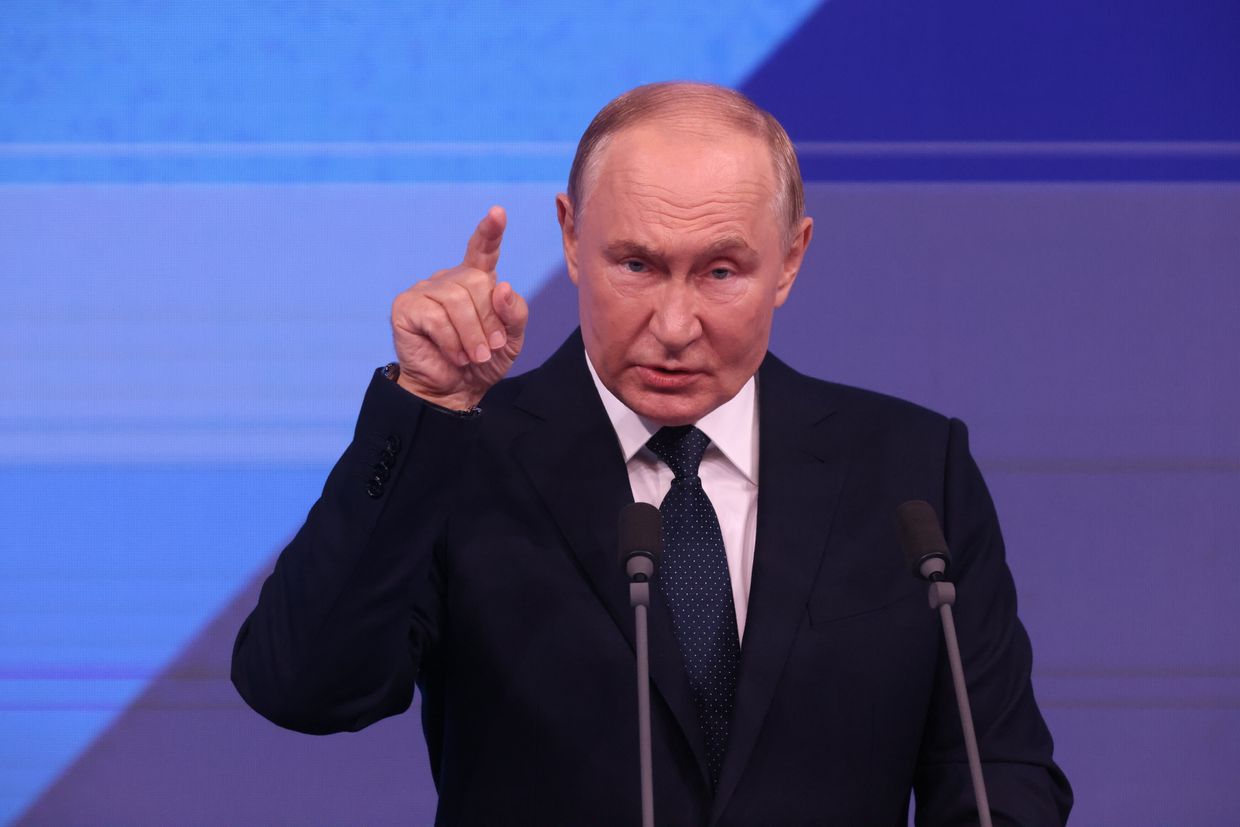Opinion: With elections ahead, Georgia stands between Russia and the West
Georgia’s government is playing a dangerous double game, drifting from its Euro-Atlantic path toward Moscow’s influence.

Georgian students protest the controversial "foreign agents" bill outside the Georgian parliament in Tbilisi, Georgia, on May 13, 2024. (Giorgi Arjevanidze / AFP via Getty Images)

Tamar Kintsurashvili
Executive director of the Media Development Foundation
Two years ago, a Georgian pro-Kremlin fringe channel aired a fabricated story featuring photoshopped images of several NGO representatives, including myself, in handcuffs at a fictional trial. This scenario, supposedly the result of a meeting between then-Georgian Prime Minister Irakli Garibashvili and Russian President Vladimir Putin, was laughable at the time – a case of wishful thinking by pro-Kremlin actors. The current situation in Georgia is no longer a joke.
The West’s first wake-up call came when the Georgian government decided to reintroduce the so-called “foreign agents” law, inspired by the Kremlin and copied from Moscow, just ahead of the upcoming October parliamentary elections. Some foreign diplomats were genuinely surprised by this sudden shift, which deepened societal divisions and began to lead Georgia toward isolation from the West. The ruling Georgian Dream party’s actions were increasingly perceived as a direct threat to the country’s Euro-Atlantic integration.
Like a Potemkin village, the Georgian government, de-facto led by billionaire Bidzina Ivanishvili, has long played a double game – presenting itself as committed to the Euro-Atlantic path to the outside world, while crafting a different narrative at home, avoiding any mention of Kremlin-related threats to consolidate public opinion.
However, after Russia’s full-scale invasion of Ukraine, the Georgian Dream party became more openly anti-Western, aligning its rhetoric with pro-Kremlin parties like the Conservative Movement/Alt-Info and Alliance of Patriots Georgia.
The reasons behind this transformation aren’t surprising to local watchdog organizations, who have long tracked the party’s duplicitous behavior. Ivanishvili, like other autocrats, sees democracy as a threat. His government has focused its resources on dismantling key democratic institutions – media, NGOs, and the political opposition – by branding them as national traitors and enemies, a tactic reminiscent of Stalinist repression.
A year ago, the Media Development Foundation (MDF) screened “Putin’s Kiss,” a documentary about Russian youth activist Masha Drokova, who once collaborated with the radical youth movement Nashi, founded in Russia in 2005. The film caused a stir within Georgia’s liberal circles. Some optimists questioned whether Georgia would ever experience such government-supported oppression.
Soon after, we witnessed alarming changes: Georgia, once an EU candidate country, began to resemble Putin’s Russia. Russian-style vandalism occurred near our offices, though the Georgian perpetrators hid behind masks, unlike their Russian counterparts.
Like in Russia, the Georgian government uses the notion of “sovereign democracy,” a concept invented by Putin’s advisor, Vladislav Surkov, to undermine the liberal world order. This ideology holds that anyone questioning Russia’s democracy is meddling in its internal affairs. In Georgia, the ruling party and pro-Kremlin actors have repurposed this idea, arguing that Western criticism of Georgia’s democratic backsliding amounts to interference in the country’s sovereignty – suggesting Tbilisi doesn’t need another Moscow dictating its actions.
Georgian Dream even exploited the suffering of the Ukrainian people amid Russia’s war for political gain. An outdoor campaign juxtaposing Ukraine’s war-torn destruction with the “peace” offered by Georgian Dream sparked outrage, being denounced by the Ukrainian Foreign Ministry and criticized by Georgian President Salome Zourabishvili.
In 2012, the Georgian Dream’s manifesto explicitly stated that Georgia would no longer be a point of contention between the West and Russia. To avoid provoking Russia, Georgian officials avoided mentioning the Kremlin as a security threat. But by 2022, the ruling party and its allies were openly accusing Georgia’s Western partners of trying to drag the country into war and open a second front.
This shift in rhetoric leaves Georgians unsure who poses the greater threat – Russia, which occupies 20% of their country, or the West.
Russian Foreign Minister Sergei Lavrov recently offered to help Georgia “normalize relations” with its neighboring “states” (meaning Georgia’s Russian-occupied Abkhazia and South Ossetia). This controversial offer, welcomed by the ruling party, could serve as a lifeline for Georgian Dream ahead of the elections.
While Russia has no intention of restoring Georgia’s territorial integrity, it does want to keep the current government in power. That’s why the upcoming elections are so crucial – will Georgia continue moving toward the West, or will Ivanishvili lead the country deeper into the “Russian World” and further isolate the West?
Editor’s Note: The opinions expressed in the op-ed section are those of the authors and do not reflect the views of the Kyiv Independent.













